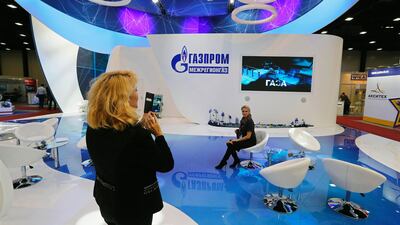King Salman became on Wednesday the first Saudi monarch to visit Russia.
Relations between the two energy superpowers, Cold War opponents and more recently commercial and political rivals, have often been tepid. Now, with unprecedented Opec cooperation and Russian involvement in the Middle East, both see benefits in deeper engagement.
Ahead of the visit, the two countries decided to set up a US$1 billion joint energy fund, and Aramco signed five memorandums of understanding with Russian firms to cooperate in petrochemicals, drilling, oilfield services and, the two most significant, oil trading and gas. The deal with Litasco, the trading arm of Lukoil, could give Aramco access to Russian-owned refineries in the Mediterranean.
And the accord with Gazprom covers liquefied natural gas trade. Aramco has looked at importing LNG to replace domestic oil for power generation, but there is no particular reason to buy from Russia. And Saudi Arabia does not have an LNG industry of its own.
Russia’s existing LNG facility in the far eastern island of Sakhalin mainly serves the East Asian market while its plant under construction on the Yamal Peninsula will use the “Northern Sea Route” through the melting Arctic to Asia. The Russian energy minister Alexander Novak has raised the possibility that Aramco could invest in a second plant at Yamal, although Aramco has denied this. Gazprom, Rosneft and the trader Gunvor have sold third-party LNG to Egypt and elsewhere from their trading portfolios, but Saudi Arabia could equally tender for imports from any supplier.
In 2015, Saudi Arabia’s Public Investment Fund had already agreed to invest $10bn over five years in the Russia Direct Investment Fund. But even this relatively modest annual amount does not yet appear to have been met. Russia, as an exporter of gas and nuclear technology, has more to gain from selling to the Saudis than vice versa.
So these energy deals mostly look like the usual stuff of such bilateral summits, and their significance will depend on the commercial realities. Both countries are hydrocarbon exporters, both are short of capital given the slump in oil prices, both are trying with some difficulty to diversify their economies. For each China makes a more natural trading partner.
_______________
Read more:
S&P: Saudi Arabia’s economic improvements driven by oil, not diversification
Saudi Aramco signs five agreements with Russian companies
Aramco on track for IPO, says Saudi energy minister
_______________
More interesting is what this visit says about Russia’s success in inserting itself into Middle East affairs. The Soviet Union’s influence was largely expelled from the region during the 1970s, with the Saudis playing a leading role in backing pro-American forces. But in recent years Russia has appeared as a military force in Syria in alliance with Iran and Bashar Al Assad, and a diplomatic player in the Iranian nuclear negotiations, in Libya’s civil war and in Egypt. The Saudis may hope to influence Russia over Iran, but not detach it from Tehran.
In energy, the state firm Rosneft’s loans have been crucial in reviving the Kurdish oil industry and setting up the autonomous region for last month’s independence referendum. Russia has gained further influence over the Turkish gas market by agreeing to construct a pipeline from Kurdistan. Lukoil and Gazprom Neft are developing large projects in southern Iraq, while they, Lukoil and the overseas state investor Zarubezhneft have preliminary deals for oilfields in Iran. Rosneft has bought into Egypt’s giant new Zohr gasfield, and taken 49 percent of the Indian refiner Essar, against reported competition from Aramco. And Rosatom has a variety of deals at different stages to build nuclear power plants in Saudi Arabia itself, Iran, Turkey, Egypt and Jordan.
In the space of a few years, Russia’s direct role in Middle East energy has gone from negligible to significant, although China has advanced even further, while western dominance has evaporated. Saudi Arabia’s upstream sector is not open to foreign equity participation and so it cannot offer any carrots here. So far Russian oil companies have not entered projects in Abu Dhabi or Qatar, but they may be interested in the Qataris’ planned LNG expansion.
Russia has been crucial in pressuring Iran to join the Opec production limits agreement, and to roping together a motley crew of non-Opec countries, including some former Soviet states, to complement it. Russia has gained in oil prices and influence without having to cut production very much. And while broadly supportive of extending the deal beyond March, it has yet to commit.
“Is there really anything in the world that’s absolutely permanent?” answered the Russian president Vladimir Putin, when asked whether Saudi Arabia would always align geopolitically with the US. These Russo-Saudi discussions do not represent some dramatic reshaping of the region’s alliances. But American Middle East policy has veered from undesirable to the GCC under the US president Obama, to incoherent under the current administration. Under any president, the natural trend of an overstretched, more isolationist and more energy self-sufficient US will be to focus limited diplomatic resources more on Asia.
There is still no other power that can replicate American military and political might in the Middle East. Just as they are trying to diversify their economies, so the regional countries are attempting to diversify their allies, gaining support on specific issues from Russia and, in future, from China and perhaps India or other outside players. Russia can be useful to Saudi Arabia, but Moscow has more levers to pull than Riyadh.
Robin M Mills is CEO of Qamar Energy, and author of The Myth of the Oil Crisis


